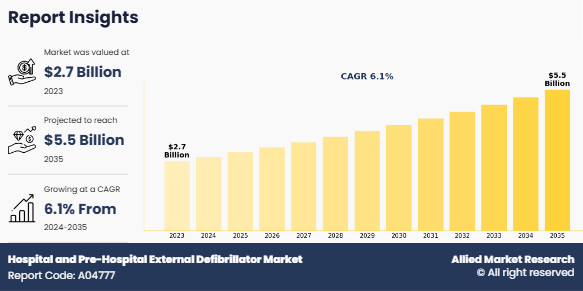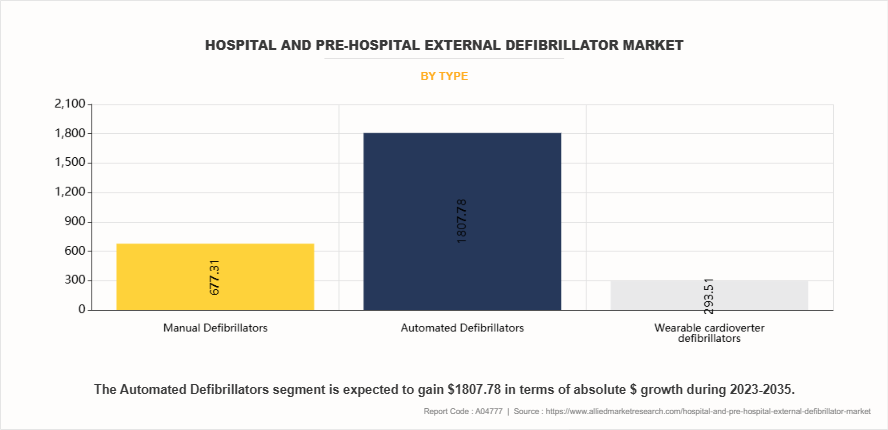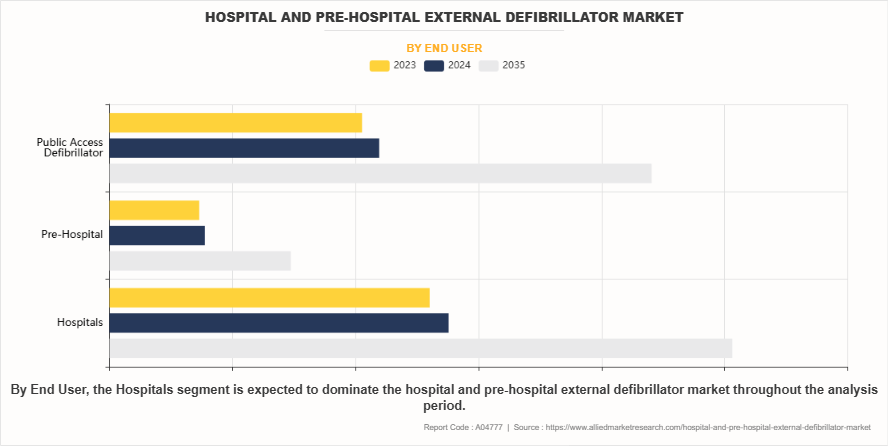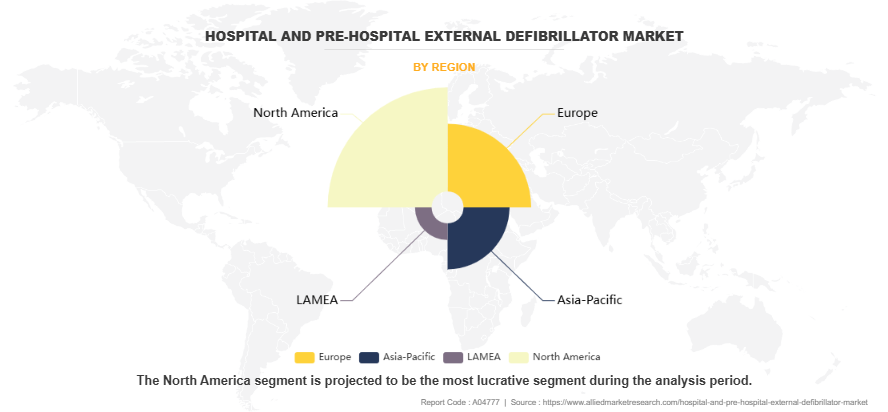Hospital And Pre-Hospital External Defibrillator Market Research, 2035
The global hospital and pre-hospital external defibrillator market size was valued at $2.7 billion in 2023, and is projected to reach $5.5 billion by 2035, growing at a CAGR of 6.1% from 2024 to 2035. The hospital and pre-hospital external defibrillator market growth is driven by increase in prevalence of cardiovascular diseases and growing geriatric population. According to the Population Reference Bureau (PRB), the number of Americans aged 65 and older is projected to increase from 58 million in 2022 to 82 million by 2050, representing a 47% rise. This demographic shift is expected to drive higher demand for defibrillators in hospitals, ambulances, and public settings to manage cardiac emergencies effectively.

An external defibrillator is a medical device designed to deliver a controlled electric shock to the heart in cases of life-threatening cardiac arrhythmias, such as ventricular fibrillation or sudden cardiac arrest. It helps restore a normal heart rhythm by momentarily stopping the heart, allowing it to re-establish an effective rhythm. External defibrillators are commonly used in emergency situations by both medical professionals and trained bystanders. There are two main types, such as manual external defibrillators used in hospitals and automated external defibrillators (AEDs) designed for public access. AEDs are portable, user-friendly devices that provide clear voice prompts and instructions, making them suitable for use in schools, airports, and other public areas. Timely use of an external defibrillator significantly increases survival rates during cardiac emergencies.
Key Takeaways
On the basis of type, the automated external defibrillator segment dominated the hospital and pre-hospital external defibrillator market Share in 2023. However, the wearable cardioverter defibrillator segment is anticipated to grow at the highest CAGR during the forecast period.
On the basis of end user, the hospitals segment dominated the market share in 2023. However, the public access defibrillator (PAD) segment is anticipated to grow at the highest CAGR during the forecast period.
Region-wise, North America generated the largest revenue in 2023. However, Asia-Pacific is anticipated to grow at the highest CAGR during the forecast period.
Market Dynamics
The hospital and pre-hospital external defibrillator market growth, primarily driven by rise in adoption of automated external defibrillators (AEDs) in public spaces. These devices provide immediate life-saving assistance in cases of sudden cardiac arrest (SCA), significantly improving survival rates and reducing the burden on emergency medical services (EMS). By enabling rapid intervention before the arrival of professional medical personnel, AEDs bridge a critical gap in emergency care.
Government support has played a vital role in promoting public access to defibrillators. For example, in the UK, authorities actively encourage organizations to install AEDs in high-footfall areas such as malls, sports centers, and transportation hubs. The British Heart Foundation has also contributed by mapping publicly accessible AEDs, making it easier for bystanders to locate and use them during emergencies. This proactive approach enhances community readiness, instills public confidence in managing cardiac incidents, and complements in-hospital interventions by ensuring timely defibrillation even before hospital admission. The integration of AEDs into public settings not only supports immediate response but also strengthens the broader emergency care infrastructure, thereby fueling the market growth.
Moreover, rise in incidence of cardiovascular diseases (CVDs) is another significant factor driving the demand for external defibrillators. Conditions such as SCA, ventricular fibrillation, and arrhythmias require prompt defibrillation to prevent fatal outcomes. The growing prevalance of these heart-related conditions necessitates the availability of efficient defibrillation systems across hospitals, ambulances, and community spaces. As reported by the Centers for Disease Control and Prevention (CDC), heart disease remains the leading cause of death in the U.S., with over 6.2 million adults living with heart failure as of January 2023. This alarming statistic underscores the critical importance of having external defibrillators readily available to ensure immediate response and improve patient outcomes. ncrease in CVDs is largely attributed to sedentary lifestyles, unhealthy diets, smoking, stress, and aging population, all of which are contributing to rise in demand for defibrillators.
Furthermore, strategic initiatives by key industry players are accelerating market expansion. Companies such as Mediana are broadening their international footprint through events like Arab Health 2025 to engage with regional customers and promote advanced defibrillation solutions. Government-backed emergency response initiatives and public access defibrillation programs are further strengthening the adoption of these devices. Combined with increasing healthcare infrastructure and public-private efforts, these factors are expected to propel significant growth in both developed and emerging economies.
Segmental Overview
The hospital and pre-hospital external defibrillator industry is segmented into type, end user, and region. On the basis of type, the market is segmented into manual external defibrillators, automated external defibrillator, and wearable cardioverter defibrillators. The manual external defibrillator segment is further categorized into hospitals, and pre hospitals. The automated external defibrillator segment is further categorized into hospitals, pre hospitals, and public access defibrillator (PAD).
Based on end user, the market is categorized into hospitals, pre-hospital, and public access defibrillator (PAD). The hospitals segment is further categorized into general wards, ICU, emergency room (ER), and others. The pre-hospital segment is further categorized into emergency medical services (EMS), fire departments, police, private transport companies, and others. The public access defibrillator segment is further categorized into fully automated AED, and semi-automated AED. Region-wise, the market is segmented into North America, Europe, Asia-Pacific, and LAMEA.
By Type
On the basis of type, the automated external defibrillator segment was the major revenue contributor in 2023. This is attributed to its user-friendly design, increasing adoption in public spaces like airports, schools, and malls, and supportive government regulations mandating AED installations. Rise in awareness programs on sudden cardiac arrest (SCA) and technological advancements enhancing AED accuracy and ease of use further fuel the market growth.
However, the wearable cardioverter defibrillators segment is expected to register the highest CAGR during the hospital and pre-hospital external defibrillator market forecast period. This is attributed to rise in incidence of SCA, growing acceptance of wearable cardiac monitoring devices, device miniaturization, remote monitoring integration, and favorable reimbursement policies for high-risk patients.

By End user
On the basis of end user, the hospitals segment held the largest market share in 2023, driven by the high volume of emergency cases, advanced medical infrastructure, and availability of well-equipped cardiac care units (CCUs). The constant need for external defibrillators in critical care settings, surgical procedures, and emergency response teams has led to increase in adoption within hospitals. Furthermore, supportive reimbursement policies, rise in incidences of cardiovascular diseases (CVDs), and availability of skilled medical professionals have lead to the segment growth.
However, the public access defibrillator (PAD) segment is projected to register the highest CAGR during the forecast period, owing to government initiatives promoting AED installations in public locations, rise in awareness of sudden cardiac arrest (SCA), and widespread CPR and AED training programs. In addition, advancements in user-friendly, AI-enhanced defibrillators and the expanding implementation of PAD programs across workplaces, airports, and educational institutions are further propelling the market growth.

By Region
North America dominated the hospital and pre-hospital external defibrillator market share in 2023 owing to its well-established healthcare infrastructure, high prevalence of cardiovascular diseases (CVDs), and strong presence of leading market players. The region’s dominance was further supported by the widespread use of automated external defibrillators (AEDs) in public spaces, favorable reimbursement policies, and proactive government initiatives for cardiac emergency preparedness. Also, increased investments in emergency medical services (EMS) and ongoing technological advancements in defibrillator devices contributed to the market’s growth.
However, the Asia-Pacific region is expected to register the highest CAGR during the forecast period driven by rise in incidence of CVDs, an expanding elderly population, and increased healthcare investments. Enhancements in EMS systems, improving healthcare infrastructure, and growing awareness of AEDs are further supporting market expansion. Moreover, government support, growing adoption of advanced medical technologies, and presence of key players are accelerating the development and market growth in the region.

Competition Analysis
Competitive analysis and profiles of the major players in hospital and pre-hospital external defibrillator market size are Stryker Corporation, Asahi Kasei Corporation, Koninklijke Philips N.V., MEDIANA CO., LTD, Shenzhen Mindray Bio-Medical Electronics Co. Ltd., Nihon Kohden Corporation, PROGETTI SRL, GE Healthcare, CU medical systems, inc., and Avive Solutions, Inc. are provided in the report. The key players have adopted product approval, product launch, and agreement as the key strategies for expansion of their product portfolio.
Recent Developments in Hospital and pre-hospital external defibrillator Industry
In March 2024, Stryker, a global leader in medical technologies, participated at the Criticare National Conference (2024), held from March 1st to 3rd at the ITC Royal Bengal in Kolkata, India. During the event, Stryker launched and showcased two new products, “LIFEPAK CR2 automated external defibrillator (AED) for cardiac care” and “Evacuation Chair” for emergency patient evacuation.
In January 2023, Mindray, announced the launch of the next-generation BeneHeart series defibrillators, the BeneHeart D60 and D30. The new BeneHeart defibrillators aim to raise the standards for resuscitation with superior reliability, expert comprehensive diagnosis and monitoring tools, and introduce a whole-process quality improvement solution for both in-hospital and pre-hospital rescue.
Key Benefits for Stakeholders
- This report provides a quantitative analysis of the market segments, current trends, estimations, and dynamics of the hospital and pre-hospital external defibrillator market analysis from 2023 to 2035 to identify the prevailing hospital and pre-hospital external defibrillator market opportunity.
- The market research is offered along with information related to key drivers, restraints, and opportunities.
- Porter's five forces analysis highlights the potency of buyers and suppliers to enable stakeholders make profit-oriented business decisions and strengthen their supplier-buyer network.
- In-depth analysis of the hospital and pre-hospital external defibrillator market segmentation assists to determine the prevailing market opportunities.
- Major countries in each region are mapped according to their revenue contribution to the global market.
- Market player positioning facilitates benchmarking and provides a clear understanding of the present position of the market players.
- The report includes the analysis of the regional as well as global hospital and pre-hospital external defibrillator market trends, key players, market segments, application areas, and market growth strategies.
Hospital and Pre-Hospital External Defibrillator Market Report Highlights
| Aspects | Details |
| Market Size By 2035 | USD 5.5 billion |
| Growth Rate | CAGR of 6.1% |
| Forecast period | 2023 - 2035 |
| Report Pages | 409 |
| By Type |
|
| By End User |
|
| By Region |
|
| Key Market Players | GE HealthCare, Stryker Corporation, MEDIANA CO., LTD, CU Medical Systems, Inc., Shenzhen Mindray Bio-Medical Electronics Co., Ltd., Nihon Kohden Corporation, PROGETTI SRL, Koninklijke Philips N.V., Avive Solutions, Inc., Asahi Kasei Corporation |
Analyst Review
This section provides various opinions of top-level CXOs in the hospital and pre-hospital external defibrillator market. According to CXO insights, the market growth is primarily driven by rise in incidence of cardiovascular diseases (CVDs), increase in awareness of sudden cardiac arrest (SCA), and surge in adoption of automated external defibrillators (AEDs) in public spaces and healthcare settings. CXOs highlight that advancements in defibrillator technology, including real-time CPR feedback and connectivity features, enhance usability and effectiveness, further boosting market expansion.
CXOs also highlighted that supportive government initiatives such as funding for emergency response infrastructure, implementation of Public Access Defibrillation (PAD) programs, and expanded training programs for first responders have directly contributed to increased deployment and utilization of defibrillators across public and private settings. However, high costs of advanced defibrillators, limited insurance coverage, and stringent regulatory requirements pose significant challenges to the market growth.
North America dominates the market due to well-established emergency medical services (EMS), strong adoption of advanced medical devices, and supportive reimbursement policies. However, Asia-Pacific is expected to witness the highest CAGR during the forecast period, driven by rise in healthcare infrastructure investments, increase in aging population, and surge in awareness of SCA management in emerging economies.
The total market value of hospital and pre-hospital external defibrillator market was $2.7 billion in 2023.
The forecast period for hospital and pre-hospital external defibrillator market is 2024 to 2035.
The market value of hospital and pre-hospital external defibrillator market is projected to reach $5.5 billion by 2035.
The base year is 2023 in hospital and pre-hospital external defibrillator market .
Top companies such as Stryker Corporation, Asahi Kasei Corporation, Koninklijke Philips N.V., MEDIANA CO., LTD, Shenzhen Mindray Bio-Medical Electronics Co., Ltd.,held a high market position in 2023.
Loading Table Of Content...
Loading Research Methodology...


